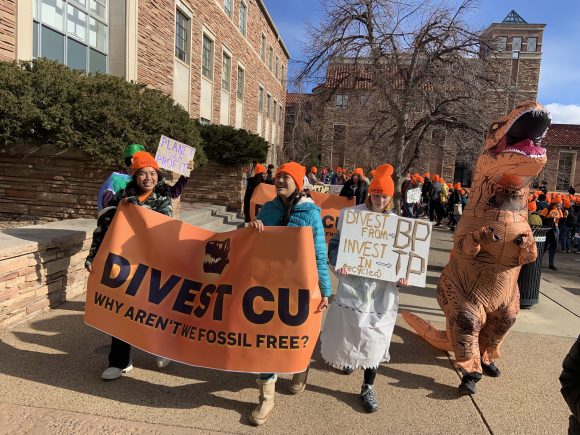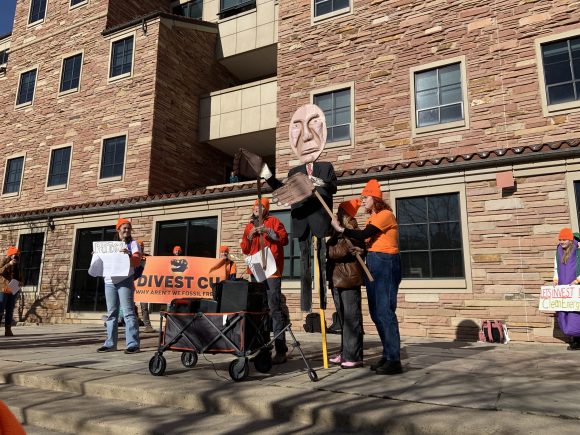
Students march towards the Benson Earth Sciences building to demand CU divest from fossil fuels on Dec. 2, 2022. (Henry Larson/CU Independent)
As climate activists from around the world gathered on the second day of a conference on climate change, University of Colorado Boulder students, staff and faculty marched across campus calling on the Board of Regents to divest from fossil fuel company investments.
Demonstrators dressed in bright orange shirts and hats reading the word “DIVEST” gathered outside the University Memorial Center at noon on Dec. 2 where representatives from up to 94 countries were meeting at the Right Here, Right Now Global Climate Summit.
“Our community wants it. So we must demand it from our administration because they represent the community,” said graduate student and featured speaker Iván-Daniel Espinosa at the protest. “That’s their job. It’s time to divest from fossil fuels.”
Fossil Free CU, a climate rights organization that has been around in various iterations since 2013, organized and led the march on Friday. In 2015, a similar group of climate activists brought the issue of divestment to the Board of Regents, who rejected it in a 7-2 vote.
Sophomore Fiona Nugent joined the movement in August and helped organize Friday’s protest.
“We’re here because [the university] was investing in fossil fuels, despite promoting itself as this very green environmentally-focused university. Not only does that go against our values it really threatens the future of its students,” Nugent said. “It’s also a terrible decision economically. Solar energy, wind energy and green energy are going to expand exponentially in the next few years.”
For its part, the university has promoted its track record with sustainability, and its promise to be carbon neutral by 2050. However, getting CU to divest from fossil fuels might prove more troublesome going forward.
In a written statement published before the event, Chancellor Philip DiStefano and Chief Sustainability Officer Heidi VanGenderen said the issue of divestment of the University of Colorado’s financial assets is the responsibility of CU system leadership and the Board of Regents.
According to reporting by Colorado Public Radio, the university system has $270 million worth of stocks or other investments in fossil fuel companies, about 5 percent of its total investments.

Organizers mocked university officials in a skit in front of Benson Earth Sciences. Dec. 2, 2022. (Henry Larson/CU Independent)
Protesters planned to deliver the three-paged petition to administrative members at the Benson Earth Sciences building, but speakers said they were told administrators were too busy to be present.
Instead, organizers put on a skit mocking the university’s lack of attendance, using a puppet dressed in a suit to represent administrators.
Among the protesters on Friday were a variety of people in food-themed costumes, including Beth Osnes, a professor of environmental studies and theater at CU Boulder, dressed as a carrot.
“The reason I am [dressed as a carrot] is because some of the top climate solutions involve food, which is reducing food waste, and also a plant-based diet,” she said. “We can also be divesting to really reduce our consumption of fossil fuels.”
Osnes, and others like her, hope that Friday’s march will be a sign to university officials that divesting from fossil fuels is a concrete step they can take to address climate change.
“I hope we create the plan to begin divesting,” Osnes said. “I think it’s an opportune time for us to really mobilize and make the requests…we’re part of this UN conference right now on human rights and climate change.”
CU Boulder Student Government (CUSG) Representative Jess Alschuler authored a resolution in support of the group. The resolution, if passed by CUSG’s legislative council, would officially endorse Fossil Free CU and its mission.
“We’re definitely asking for a plan on how [the university] intends to divest in multiple ways and basically just increase the sustainability of CU,” Alschuler said.
The resolution will face its second reading at the legislative council’s final meeting of the session on Thursday, Dec. 8.
There are some signs of progress for Fossil Free CU at the university system level, as well.
In a written statement, Ken McConnellogue, the CU system’s acting Vice President for communication said Regent Lesley Smith met with members of Fossil Free CU to describe ways they can advance their cause to the board.
“One of CU Boulder’s guiding principles is to be engaged in the world, and the students’ actions [at the protest] reflect that,” McConnellogue said.
You can listen to an audio version of this story here.
Henry Larson contributed to this story.
Contact CU Independent Senior News Editor Bella Hammond at isabella.hammond@colorado.edu.
